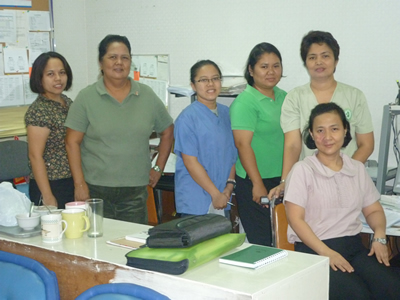"First-line Forever"
In the Philippines, Stopping Drug Resistance Before It Starts
July 2010 - Approximately 950 people are on antiretroviral therapy (ART) in the Philippines, and Dr. Rossana Ditangco knows them all.
As head of the AIDS Research Group at the Research Institute for Tropical Medicine (RITM) near Manila, she may not have met them all in person but she has become familiar with key details of their lives: where and when they get their medications, what kind of support they receive from their healthcare providers, and how their immune systems are responding to treatment. This knowledge comes from an ambitious new program—inspired in part by RITM's participation in the TREAT Asia Studies to Evaluate Resistance (TASER)—to enhance treatment adherence and monitor the emergence of drug resistance in the Philippines.
Preventing drug resistance, which can lead to failure of first-line treatment, is particularly important in countries like the Philippines where access to second-line drugs is limited due to cost. Dr. Ditangco began planning the resistance monitoring program several years ago when first-line ART became more widely available in the Philippines. "Thanks to my constant interaction with other clinicians and researchers in the region, I knew that drug resistance was one of the major challenges of scaling up treatment," she explained.

Staff at RITM’s AIDS Research Group (from left): Cresset Manucat, Elizabeth Navo, Laila Grace Marquez, Rosa Lyn Bantique, Ana Inocencio, and Dr. Rossana Ditangco.
|
Drug resistance is not widespread in the Philippines, which is how Dr. Ditangco and her colleagues want to keep it. "Our motto is First-line Forever," she says. Among the small population of patients who are experiencing treatment failure as a result of resistance, most have been living with HIV for many years and began taking ART before the country had a systematic treatment and counseling program.
Dr. Ditangco and her colleagues spent more than two years developing the monitoring program, aided by the technical assistance they received through TASER. The program she has designed includes training for healthcare workers on treatment guidelines and adherence counseling, a physician guidebook, informational materials for patients, and standardized enrollment forms and adherence evaluation forms. It also includes a standard operating procedure for patient enrollment, monitoring, and laboratory testing, which includes regular CD4 and viral load testing, as well as resistance testing.
"TASER enabled me to bring the technology into the country, and then transfer the technology to the national program," she said. "I've also been able to interact with top scientists in the area, which is very important. In developing countries like the Philippines, we would not have access to this technology and knowledge without joining a regional group like TREAT Asia."
In addition to her role as a researcher, Dr. Ditangco is still a practicing physician, caring for patients at RITM who are enrolled in TASER and the TREAT Asia HIV Observational Database (TAHOD). "Working in the field helps me see firsthand what is going on," she explained. "Patients now are very educated when it comes to treatment. But they are still dealing with personal issues that interfere with adherence, and that's very difficult to contend with. We have to do a lot of counseling."
According to Dr. Ditangco, RITM acts as the "central nervous system" of the national treatment program, overseeing a network of treatment hubs—government hospitals that provide ART. For the monitoring program, Dr. Ditangco established a database into which HIV/AIDS clinicians across the country enter all their patients' information, and then transfer the data to RITM for analysis.
Following the first data transfer this spring, most participating clinicians are enthusiastic about the program. "They are all in agreement that we cannot allow drug resistance to develop because we may not be able to provide second-line treatment to everyone," said Dr. Ditangco.